woelen
Super Administrator
        
Posts: 8089
Registered: 20-8-2005
Location: Netherlands
Member Is Offline
Mood: interested
|
|
Collection of colored gases/vapors
Just for the fun of it, I made a nice small collection of colored gases and put them in ampoules so that they can be displayed at any time.
Currently I have 7 gases/vapor in ampoules. All of these ampoules were made with air, saturated with vapor, at 15 C. This allows displaying of the
gas/vapor at room temperature without the risk of formation of condensed liquid at the inside of the ampoule. Of course, the really gaseous things are
made just out of 100% gas. All gases are dried meticulously with P4O10 before ampouling.
I made the following:
- Cl2: from TCCA + HCl
- ONCl: Dripping concentrated solution of NaNO2 in conc. HCl at low temperature
- ONBr: Adding solid NaNO2 to 48% HBr
- Br2: Dripping a small amount of Br2 in a vessel and allowing all of it to evaporate in the loosely closed vessel. This takes a long time.
- IBr: Adding a small amount of IBr to a vessel and allowing it to evaporate. It was heated with the hand, otherwise it took ages. After formation of
the vapor a 50% air/50% vapor mix was ampouled to be sure that no solid material collects at the glass wall.
- NO2: from solid NaNO2 added to dilute H2SO4. This gives a mix of NO and NO2. For this reason, I ampouled a mix of this gas and oxygen.
- BrCl: Made by adding Br2 to an excess amount of Cl2. The Br2 reacts with Cl2 forming gaseous BrCl (it evaporates very quickly due to this) and
drives away part of the Cl2. My ampoule almost certainly is not pure BrCl, but also contains some excess Cl2, whose color is completely masked though.
Here follow some pictures of these gases (click the pictures for hires images):
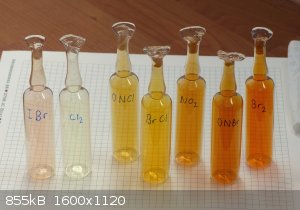
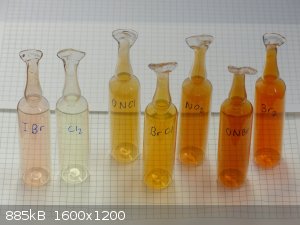
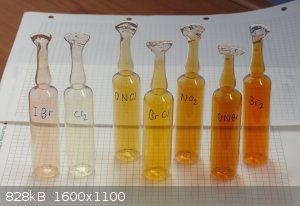
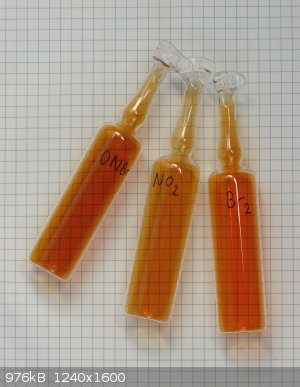
Any ideas for other colored gases/vapors? The gases must be stable on storage. I myself consider vapor of CrO2Cl2. I tried dilute ClO2, but that does
not keep well. Its color fades quickly.
|
|
|
BromicAcid
International Hazard
    
Posts: 3273
Registered: 13-7-2003
Location: Wisconsin
Member Is Offline
Mood: Rock n' Roll
|
|
Pretty, thanks for sharing. Of course diazomethane and dichloroacetylene are off the table.
|
|
|
DraconicAcid
International Hazard
    
Posts: 4421
Registered: 1-2-2013
Location: The tiniest college campus ever....
Member Is Offline
Mood: Semi-victorious.
|
|
Isn't ozone blue, or is that only at high pressures? Iodine vapour, of course, is nice.
Please remember: "Filtrate" is not a verb.
Write up your lab reports the way your instructor wants them, not the way your ex-instructor wants them.
|
|
|
arkoma
Redneck Overlord
      
Posts: 1763
Registered: 3-2-2014
Location: On a Big Blue Marble hurtling through space
Member Is Offline
Mood: украї́нська
|
|
Yes it is ^^ As are the gasses you ampouled too. I'm so screwed up from the bike crash who knows how long it will be before I'm active so its nice to
be in the lab vicariously.
"We believe the knowledge and cultural heritage of mankind should be accessible to all people around the world, regardless of their wealth, social
status, nationality, citizenship, etc" z-lib
|
|
|
JustMe
Hazard to Others
  
Posts: 111
Registered: 7-8-2003
Member Is Offline
Mood: No Mood
|
|
Manganese Heptoxide? / Permanganic Acid
|
|
|
DraconicAcid
International Hazard
    
Posts: 4421
Registered: 1-2-2013
Location: The tiniest college campus ever....
Member Is Offline
Mood: Semi-victorious.
|
|
Those aren't gases, and aren't stable.
Please remember: "Filtrate" is not a verb.
Write up your lab reports the way your instructor wants them, not the way your ex-instructor wants them.
|
|
|
j_sum1
Administrator
       
Posts: 6374
Registered: 4-10-2014
Location: At home
Member Is Offline
Mood: Most of the ducks are in a row
|
|
What a cool project -- and challenging too.
It seems to me that there is a chunk of the spectrum missing. We have the yellows to browns. We have a hint of purple. But we don't really have a
vivid red, a definitive green and nothing from the blue zone. Which gets me wondering...
Is a blue gas actually possible at ambient conditions? Is there a technical reason why we are mostly limited to the orange-brown colorations? (Kind
of like why there are no green stars." Just wondering.
I was going to propose iodine vapours also but I think any successful attempt probably has to have some residual solid clinging to the glass and most
likely be without air included.
|
|
|
Metacelsus
International Hazard
    
Posts: 2544
Registered: 26-12-2012
Location: Boston, MA
Member Is Offline
Mood: Double, double, toil and trouble
|
|
I was also wondering about the possibility of a blue colored gas. Dinitrogen trioxide is blue, but at temperatures where it's a gas, the equilibrium
favors nitrogen monoxide and nitrogen dioxide. Google searches for "blue colored gas" all return results for dyed gasoline, so I haven't had luck
there.
|
|
|
zwt
Hazard to Self
 
Posts: 84
Registered: 1-8-2016
Member Is Offline
Mood: No Mood
|
|
A blue gas?
A quick search turned up trifluoronitrosomethane.
Not the easiest synthesis, also, it might attack a glass ampule.
|
|
|
phlogiston
International Hazard
    
Posts: 1381
Registered: 26-4-2008
Location: Neon Thorium Erbium Lanthanum Neodymium Sulphur
Member Is Offline
Mood: pyrophoric
|
|
ozone is supposed to be pale blue.
-----
"If a rocket goes up, who cares where it comes down, that's not my concern said Wernher von Braun" - Tom Lehrer |
|
|
ave369
Eastern European Lady of Mad Science
   
Posts: 596
Registered: 8-7-2015
Location: No Location
Member Is Offline
Mood: No Mood
|
|
Ozone is not stable. In gaseous form, it decays into oxygen. In liquid form, it's a hair-trigger explosive.
Smells like ammonia....
|
|
|
woelen
Super Administrator
        
Posts: 8089
Registered: 20-8-2005
Location: Netherlands
Member Is Offline
Mood: interested
|
|
I actually tried iodine vapor, but the color of the vapor at room temperature is so weak that it is not interesting anymore. If a little too
concentrated iodine vapor is used, then the glass quickly becomes covered with brown stain, giving tha ampoule an ugly appearance.
I knew of CF3NO. This sounds very interesting, but making this gas is not something, easily done by a home chemist. The required chemicals are very
hard to obtain and quite hazardous.
It indeed is striking that colored gases all are in the yellow/orange/red range of the spectrum. Chlorine is somewhat borderline with a clearly green
hue. ClO2 also is very bright yellow with a greenish hue, but keeping that gas around in an ampoule is not possible. The color fades over one day (I
tried it with 30% ClO2 / 70% air).
At higher temperature, there are more possible colors: deep purple iodine, bright yellow NbCl5 and green VOCl3.
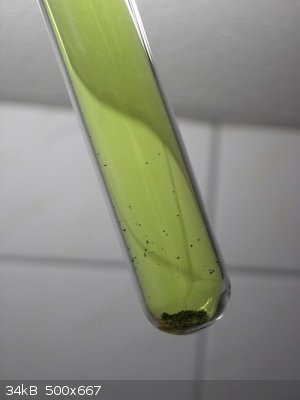
This requires tempratures of 300 C or so. So, unfortunately, I cannot ampoule some of this green gas.
|
|
|
MeshPL
Hazard to Others
  
Posts: 329
Registered: 20-4-2015
Location: Universe
Member Is Offline
Mood: No Mood
|
|
Chromyl chloride is quite volataile, but has rather reddish colour so that doesn't add anything new.
|
|
|
unionised
International Hazard
    
Posts: 5135
Registered: 1-11-2003
Location: UK
Member Is Offline
Mood: No Mood
|
|
The subject of blue gases has been discussed before
http://www.sciencemadness.org/talk/viewthread.php?tid=30354
|
|
|
diddi
National Hazard
   
Posts: 723
Registered: 23-9-2014
Location: Victoria, Australia
Member Is Offline
Mood: Fluorescent
|
|
huge vote of encouragement to you woelen. I am very keen to see some more colours!
Beginning construction of periodic table display
|
|
|
clearly_not_atara
International Hazard
    
Posts: 2836
Registered: 3-11-2013
Member Is Offline
Mood: Big
|
|
| Quote: | [quote=woelen] Making [nitrosotrifluoromethane] most likely is beyond the reach of nearly all amateurs.
|
The German Wikipedia page suggests that the reaction between NOCl and silver trifluoroacetate may generate this compound by a sort of
nitroso-Hunsdiecker reaction. Silver trifluoroacetate may itself be prepared from trichloroacetic acid and silver fluoride, which is a very accessible
reaction ("otc") but very dangerous.
However, the other famous nitroso compound, 2-nitroso-2-methylpropane aka t-butylnitrosyl, tends to dimerize. In fact, t-butylnitrosyl is a "volatile
blue liquid", which is about as good a candidate blue gas as any, but it dimerizes to a colorless solid. I suspect other blue compounds based on the
nitroso group will have the same limitation. In fact, perfluorothioacetone also has the unfortunate tendency to dimerize! So it might as well be
pointed out that nitrosobenzene:
http://en.wikipedia.org/wiki/Nitrosobenzene
http://orgsyn.org/demo.aspx?prep=cv3p0668
boils at just 59 C under 18 mmHg, and could probably be brought down to 20C at 3-4 mmHg. Unlike all those other compounds, nitrosobenzene is quite
easy to synthesize. It could possibly be ampouled with argon and cracked in sunlight?
|
|
|
j_sum1
Administrator
       
Posts: 6374
Registered: 4-10-2014
Location: At home
Member Is Offline
Mood: Most of the ducks are in a row
|
|
I believe that sodium gas is blue and potassium gas is green. But these gases at room temperature are not attainable.
|
|
|
clearly_not_atara
International Hazard
    
Posts: 2836
Registered: 3-11-2013
Member Is Offline
Mood: Big
|
|
Oh -- you might be able to make trifluoronitromethane by the reactiin of chloropicrin with silver fluoride. Reduction gives a blue gas.
|
|
|
Noucky
Harmless

Posts: 1
Registered: 11-4-2018
Member Is Offline
Mood: No Mood
|
|
NO2 ampoule
Hello!
What kind of ampoules did you by to do this!?
Thanks for your response.
|
|
|
woelen
Super Administrator
        
Posts: 8089
Registered: 20-8-2005
Location: Netherlands
Member Is Offline
Mood: interested
|
|
I purchased these ampoules at this eBay seller. Most convenient are the 10 ml ampoules.
https://www.ebay.nl/usr/sir_doll?_trksid=p2060353.m1438.l275...
|
|
|
Morgan
International Hazard
    
Posts: 1732
Registered: 28-12-2010
Member Is Offline
Mood: No Mood
|
|
On the subject of iodine vapor, I thought it might be interesting to try to heat it in a somewhat sealed quartz tube with a piston so that you could
watch the intensity of the color vary as a thermoacoustic piston rises and falls, compressing and relaxing the vapor pressure - something akin to the
"Thermoacoustic Quartz Piston" posted on YouTube.
|
|
|
Doped-Al2O3-fusion
Hazard to Self
 
Posts: 99
Registered: 11-4-2018
Member Is Offline
Mood: Maniacal
|
|
This is awesome! I have only one sealed ampule of gas and it's hydrogen I generated through electrolysis. It looks like nothing, but I still think
it's pretty cool.
|
|
|
j_sum1
Administrator
       
Posts: 6374
Registered: 4-10-2014
Location: At home
Member Is Offline
Mood: Most of the ducks are in a row
|
|
Sealing H2 must have been fun! Not the easiest to begin with.
|
|
|